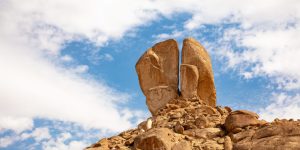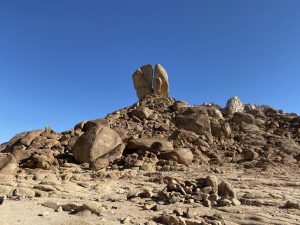The Significance of Mount Horeb By Babatunde Olugboji
In the Bible, Mount Horeb is synonymous with Mount Sinai, the site where the Hebrew people established a covenant with God following their liberation from slavery in Egypt (Deuteronomy 5:2; 1 Kings 8:9; 2 Chronicles 5:10). It is also the location where Moses received the 10 Commandments along with various instructions for the people as they progressed through the desert towards the Promised Land (Exodus 33:6; Malachi 4:4). 
Referred to as ‘the mountain of God’ in the scriptures, Mount Horeb or Mount Sinai is mentioned in Exodus 3:1, 4:27, and 18:5. The term Horeb is derived from a Hebrew word meaning ‘desert.’ Most events described in the book of Exodus that occur at Mount Sinai are attributed to Mount Horeb in Deuteronomy, which predominantly uses the name Horeb for the mountain of God, with the exception of one instance in Deuteronomy 33:2. This reference to Sinai may pertain to the surrounding wilderness rather than the mountain itself.
Prior to the exodus, while Moses was caring for the flocks of his father-in-law, Jethro, he approached the slopes of Mount Horeb one day. There, he observed a bush that was ablaze yet not consumed. As Moses examined this extraordinary sight, God addressed him from the flames. Calling him by name, the Lord instructed Moses to approach Pharaoh and lead the Israelites out of bondage in Egypt (Exodus 3:1–12).
Following the exodus, as the Israelites traversed the desert, they experienced severe thirst and began to voice their grievances to Moses regarding the lack of water. The Lord directed Moses to strike the rock at Horeb to provide them with drinking water (Exodus 17:1–7). In Exodus 19—20, the Israelites encamped at the foot of Mount Horeb while Moses ascended the mountain to receive divine guidance. The people were informed that they would receive God’s commandments from the mountain and would even hear the Lord’s voice.
After three days of preparation, God would reveal Himself to all the people. Moses established boundaries to restrict their movement, and they were warned that touching the mountain would result in death. On the third day, amidst thunder, lightning, and the sound of trumpets, a dense cloud of smoke enveloped the mountain as God descended upon it. Subsequently, Moses descended with the 10 Commandments and all the legal instructions.
The book of Deuteronomy emphasizes that God established a covenant with the Israelites at Mount Horeb (Deuteronomy 5:2) and delivered the 10 Commandments (Deuteronomy 5:6–21). While encamped there, the Israelites created a golden calf idol for worship, which incited God’s anger (Deuteronomy 9:13–29; Psalm 106:19).
From Mount Horeb, the Israelites embarked on an 11-day journey to Kadesh-barnea (Deuteronomy 1:2, 19). Later, the prophet Elijah sought refuge at Mount Horeb due to the threat from Jezebel (1 Kings 19:1–8). He took shelter in a cave and experienced a profound encounter with God, who communicated not through a windstorm, earthquake, or fire, but through a soft whisper. At Horeb, God also directed Elijah to anoint Hazael as king of Syria, Jehu as king of Israel, and designated Elisha as Elijah’s successor (1 Kings 19:9–21).
Have you learned a thing or two about Mount Horeb?
Have a blessed week.
Questions or comments?
Reach out on +1-732-554-1376 (WhatsApp)


